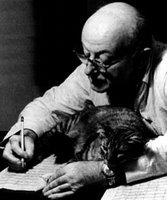 Henry Cowell born 11 March in 1897 (d. 1965)
Henry Cowell born 11 March in 1897 (d. 1965)Henry Cowell was an American composer, musical theorist, pianist, teacher, publisher, and impresario.
Henry Cowell was born in Menlo Park, California, where he was unconventionally home-schooled by his left-wing writer parents, and surrounded by a wide variety of different music, from Irish and American folk to a wide variety of what would now be called World Music. Musically gifted from an early age, he began to study music formally at the University of California and went on to teach music in California and New York.
 He was hugely influential, expanding on European classical traditions to explore Appalachian, Irish, Chinese, Japanese, Javanese, African, Indian and Tahitian music. He was a true musical innovator; The Tides of Manaunaun (1912) was the first to include tone clusters, The Aeolian Harp (1923) required the soloist to directly play the strings of a piano without the keyboard. In 1931, he worked with Russian engineer and electronic music pioneer, Leon Theremin, to create an early electronic keyboard called the Rhythmicon.
He was hugely influential, expanding on European classical traditions to explore Appalachian, Irish, Chinese, Japanese, Javanese, African, Indian and Tahitian music. He was a true musical innovator; The Tides of Manaunaun (1912) was the first to include tone clusters, The Aeolian Harp (1923) required the soloist to directly play the strings of a piano without the keyboard. In 1931, he worked with Russian engineer and electronic music pioneer, Leon Theremin, to create an early electronic keyboard called the Rhythmicon.He composed some twenty symphonies and many other orchestral and choral works, including his best known work Fuguing Tunes (1945-1945).
He was a teacher and mentor to many other composers including John Cage, George Gershwin and Burt Bacharach, and particularly championed the music of Charles Ives. He did much to develop and promote and inspire contemporary music.
However, his career took an unexpected downward turn in 1936 when he was arrested for having sexual relations with a seventeen year old youth. Hoping for leniency, he pleaded guilty to that and related charges, but was sentenced to fifteen years in prison.
He continued to compose and write, but his reputation was destroyed, although he was loyally supported by family, friends and colleagues, including Martha Graham and Percy Grainger. Charles Ives, for whom he had done so much, dropped him like a hot stone.
He was paroled in 1940, and in 1942 received a pardon and became a Senior Music Editor in the Office of War Information. Shgortly after his parole he married a prominent folk music scholar who had been prominent in campaigning for his release. Whether this was a genuine love match or a marriage of convenience to complete his 'rehabilitation' is not clear, although the marriage was musically productive and lasted twenty-five years.
 He spent the rest of his life continuing to compose, write and teach. He received many honours and grants, including his election to the American Institute of Arts and Letters in 1951.
He spent the rest of his life continuing to compose, write and teach. He received many honours and grants, including his election to the American Institute of Arts and Letters in 1951.Hugely significant in expanding the cultural and experimental boundaries of classical music, he has never been regarded as the significant composer his early career suggested. Whether this is due to the unfortunate disruption of his imprisonment, or to his unconventional musical approach, is anyone's guess.
Recordings of his work are available, including some on the excellent budget Naxos label.